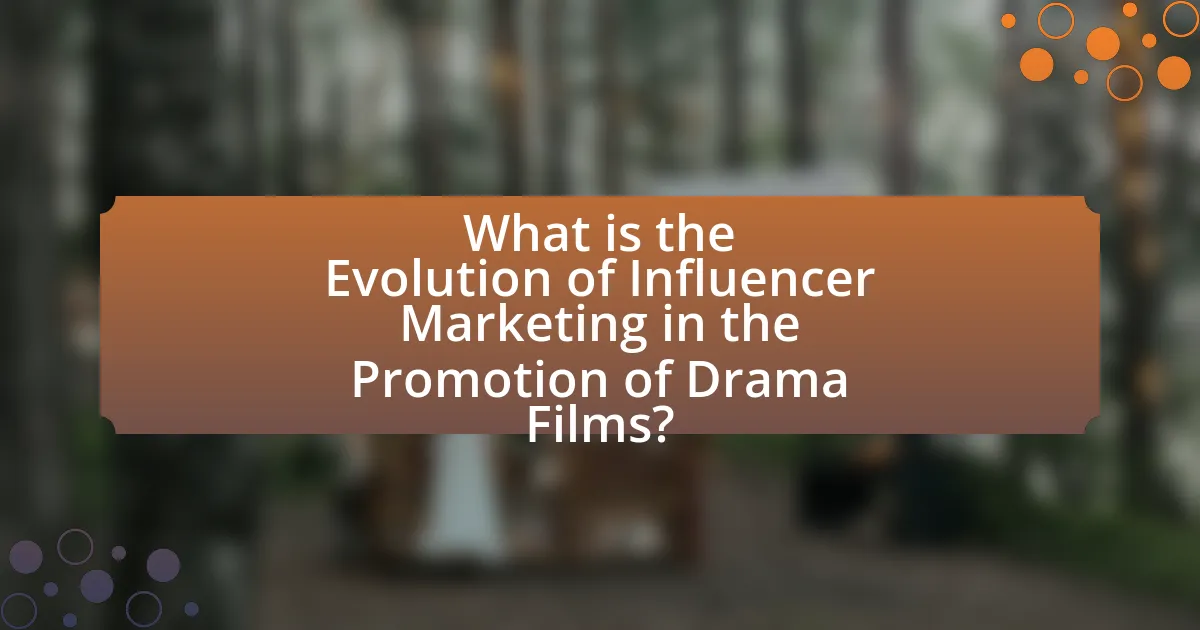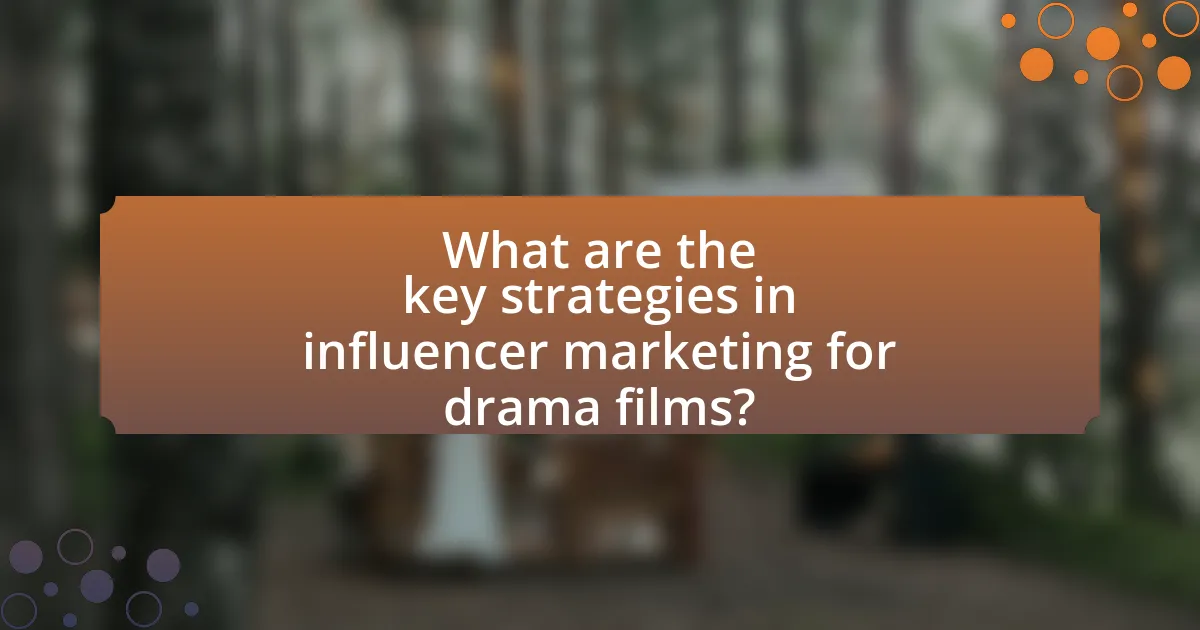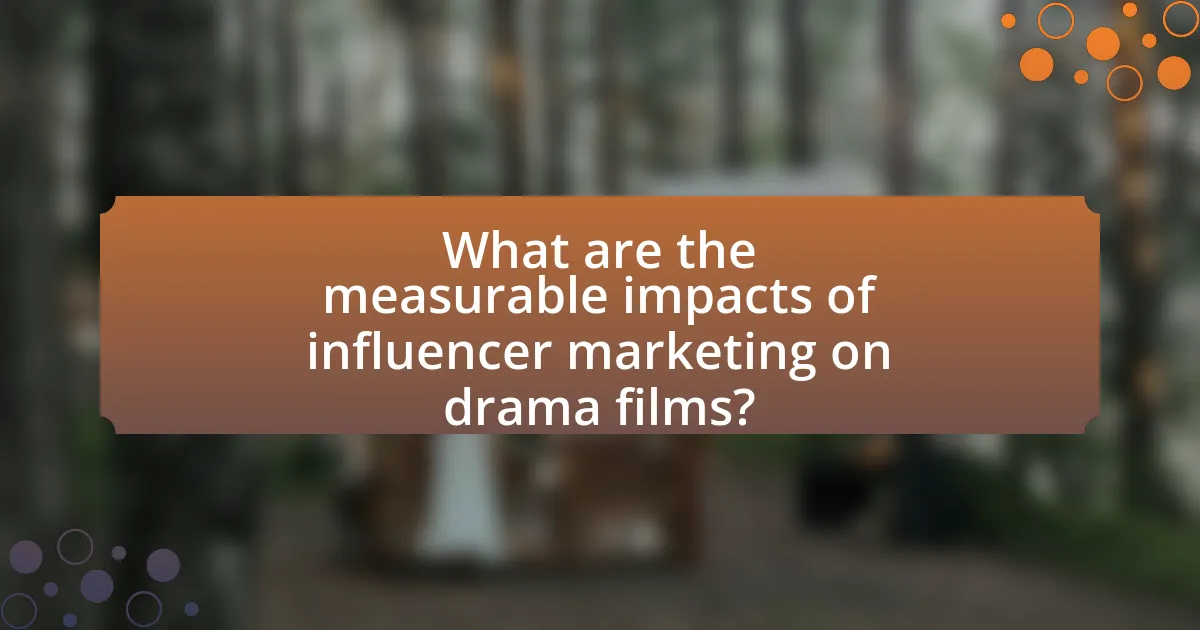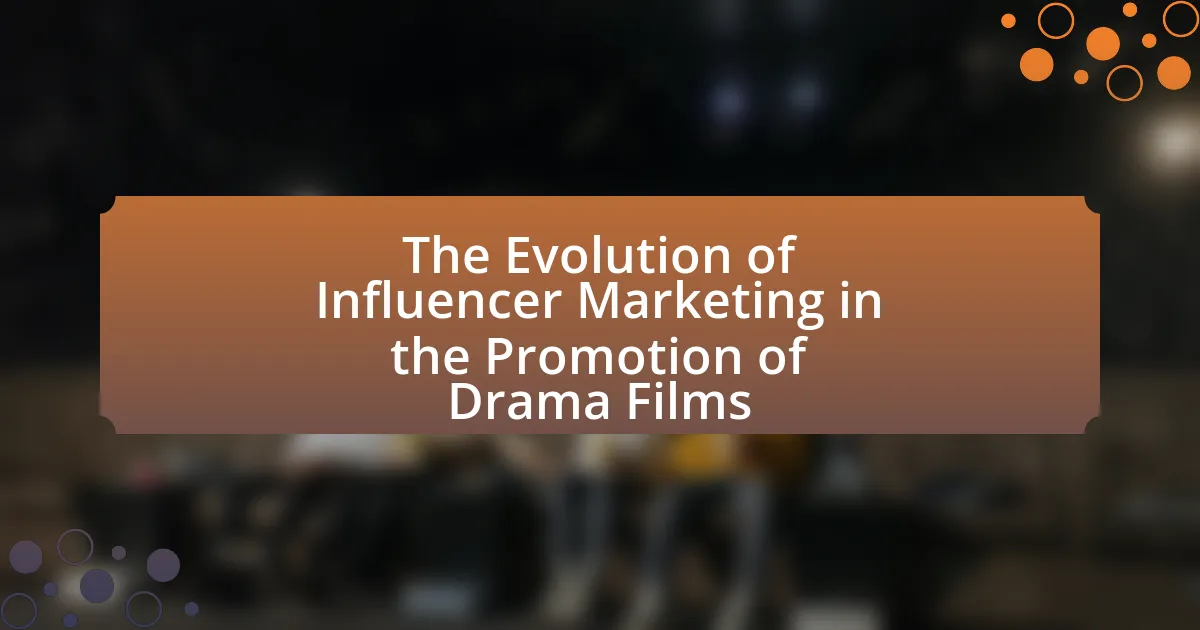The article examines the evolution of influencer marketing in the promotion of drama films, highlighting the shift from traditional celebrity endorsements to the use of social media influencers. It discusses how this transition has enabled filmmakers to engage niche audiences through authentic content and storytelling, resulting in increased viewer interest and ticket sales. Key historical milestones, technological advancements, and the significance of influencer marketing for drama films are explored, along with the unique challenges faced in this genre. The article also outlines effective strategies for influencer collaboration, content creation, and measuring campaign success, emphasizing the importance of authenticity and audience alignment in achieving marketing goals.

What is the Evolution of Influencer Marketing in the Promotion of Drama Films?
The evolution of influencer marketing in the promotion of drama films has transitioned from traditional celebrity endorsements to leveraging social media influencers for targeted engagement. Initially, drama films relied on high-profile actors to generate buzz through interviews and appearances, but the rise of platforms like Instagram and TikTok has shifted focus to micro and nano influencers who connect with niche audiences. For instance, a study by the Influencer Marketing Hub in 2021 indicated that 90% of marketers found influencer marketing effective, particularly in reaching younger demographics who engage more with relatable figures than traditional celebrities. This shift has allowed drama films to create authentic narratives and foster community discussions, enhancing viewer interest and ticket sales.
How has influencer marketing changed over the years in the context of drama films?
Influencer marketing in the context of drama films has evolved significantly from simple endorsements to complex, multi-platform campaigns. Initially, influencers primarily promoted films through basic social media posts, often focusing on celebrity endorsements. Over the years, the strategy has shifted to include more authentic content, such as behind-the-scenes access, live Q&A sessions, and interactive storytelling, which engage audiences on a deeper level.
For instance, the rise of platforms like TikTok has allowed influencers to create short, creative content that resonates with younger audiences, leading to increased engagement and ticket sales. According to a 2022 study by the American Marketing Association, campaigns that utilized influencers for drama films saw a 30% increase in audience reach compared to traditional marketing methods. This shift reflects a broader trend towards personalized marketing, where influencers act as trusted voices, enhancing the emotional connection between the film and its potential viewers.
What historical milestones mark the evolution of influencer marketing in this genre?
The historical milestones that mark the evolution of influencer marketing in the promotion of drama films include the rise of celebrity endorsements in the early 2000s, the emergence of social media platforms like Instagram and Twitter in the late 2000s, and the establishment of influencer marketing agencies in the 2010s. In the early 2000s, studios began leveraging the popularity of actors and actresses to promote films, leading to increased box office sales. The late 2000s saw platforms such as Instagram and Twitter become vital tools for influencers to engage with audiences, allowing drama films to reach niche markets effectively. By the 2010s, the formation of specialized agencies facilitated collaborations between filmmakers and social media influencers, further solidifying the role of influencer marketing in the film industry. These milestones illustrate the transition from traditional marketing methods to a more integrated approach that capitalizes on personal connections and social media reach.
How have technological advancements influenced this evolution?
Technological advancements have significantly influenced the evolution of influencer marketing in the promotion of drama films by enabling direct engagement between filmmakers and audiences through social media platforms. The rise of platforms like Instagram, TikTok, and YouTube has allowed influencers to reach vast audiences, creating a more personalized and relatable marketing approach. For instance, a study by the Digital Marketing Institute found that 49% of consumers depend on influencer recommendations, highlighting the effectiveness of this strategy in film promotion. Additionally, advancements in data analytics have allowed marketers to target specific demographics more accurately, enhancing the impact of influencer campaigns. This shift has transformed traditional marketing methods, making influencer partnerships a crucial element in the promotional strategies for drama films.
Why is influencer marketing significant for drama films?
Influencer marketing is significant for drama films because it effectively reaches targeted audiences through trusted voices. Influencers have established credibility and a loyal following, which allows them to sway public opinion and generate interest in drama films. For instance, a study by the Digital Marketing Institute found that 49% of consumers depend on influencer recommendations when making purchase decisions, highlighting the impact influencers have on audience engagement and ticket sales. This targeted approach not only enhances visibility but also fosters a deeper emotional connection with potential viewers, making it a crucial strategy in the competitive landscape of film promotion.
What unique challenges do drama films face in marketing?
Drama films face unique challenges in marketing primarily due to their niche appeal and the difficulty in conveying emotional depth through traditional promotional methods. Unlike action or blockbuster films that can rely on visual spectacle, drama films often require nuanced storytelling and character development, which are harder to encapsulate in trailers or advertisements. Additionally, the target audience for drama films is often more selective, making it challenging to reach potential viewers effectively. According to a study by the Motion Picture Association, drama films typically see lower box office returns compared to other genres, indicating that marketing strategies must be more innovative and targeted to engage audiences.
How does influencer marketing address these challenges?
Influencer marketing addresses challenges in promoting drama films by leveraging the trust and authenticity that influencers have with their audiences. This approach allows filmmakers to reach targeted demographics effectively, as influencers often have established relationships with niche communities that are more likely to engage with specific film genres. For instance, a study by the Digital Marketing Institute found that 49% of consumers depend on influencer recommendations, highlighting the effectiveness of this marketing strategy in overcoming skepticism towards traditional advertising. By utilizing influencers, drama films can enhance visibility, generate buzz, and foster a more relatable connection with potential viewers, ultimately driving ticket sales and audience engagement.

What are the key strategies in influencer marketing for drama films?
Key strategies in influencer marketing for drama films include leveraging storytelling, targeting niche audiences, and fostering authentic engagement. Storytelling is crucial as drama films thrive on emotional narratives; influencers can create relatable content that resonates with their followers, enhancing the film’s appeal. Targeting niche audiences allows marketers to connect with specific demographics that are more likely to appreciate the film’s themes, increasing the effectiveness of promotional efforts. Fostering authentic engagement through behind-the-scenes content, interviews, and interactive Q&A sessions helps build a genuine connection between the film and its audience, driving interest and viewership. These strategies are supported by data indicating that campaigns utilizing storytelling and authentic engagement see higher conversion rates and audience retention.
How do influencers select drama films to promote?
Influencers select drama films to promote based on audience alignment, personal interest, and the film’s potential for engagement. They assess whether the film’s themes resonate with their followers, ensuring that the content will be relevant and appealing. Additionally, influencers often consider the film’s marketing strategy, promotional materials, and the involvement of notable actors or directors, as these factors can enhance their credibility and the likelihood of audience interaction. Research indicates that influencers who choose films that reflect their personal brand and values tend to achieve higher engagement rates, as their authenticity resonates with their audience.
What criteria do influencers consider when choosing films?
Influencers consider several key criteria when choosing films, including the film’s relevance to their audience, the potential for engagement, and the overall quality of the content. Relevance to their audience ensures that the film aligns with the interests and preferences of their followers, which can enhance viewer engagement. The potential for engagement is assessed through factors such as the film’s themes, cast, and marketing strategy, as influencers aim to create content that resonates with their audience. Additionally, the overall quality of the film, including its production values, storytelling, and critical reception, plays a significant role in their decision-making process, as influencers seek to maintain credibility and trust with their followers.
How does the influencer’s audience impact their film selection?
The influencer’s audience significantly impacts their film selection by shaping the types of content that resonate with their followers. Influencers often analyze audience demographics, preferences, and engagement metrics to choose films that align with their audience’s interests. For instance, if an influencer’s audience predominantly consists of young adults who favor romantic dramas, the influencer is likely to select films within that genre to maintain relevance and engagement. This strategic alignment is supported by data indicating that 70% of consumers are more likely to engage with content that reflects their interests, demonstrating the importance of audience influence in film selection.
What types of content do influencers create for drama film promotions?
Influencers create various types of content for drama film promotions, including behind-the-scenes footage, interviews with cast members, and themed social media challenges. Behind-the-scenes footage provides audiences with an insider’s view of the film’s production, enhancing engagement. Interviews with cast members allow influencers to share personal insights and anecdotes, making the film more relatable. Themed social media challenges encourage audience participation and can lead to viral trends, effectively increasing the film’s visibility. These content types leverage influencers’ reach and authenticity, making them effective tools in drama film marketing strategies.
How do different content formats (videos, posts, stories) affect audience engagement?
Different content formats, such as videos, posts, and stories, significantly affect audience engagement by catering to varying preferences and consumption habits. Videos tend to generate higher engagement rates, with studies showing that video content can increase engagement by up to 1200% compared to text and image posts. Posts, particularly those with compelling visuals or strong narratives, can also engage audiences effectively, but they generally yield lower interaction rates than videos. Stories, which offer ephemeral content, create a sense of urgency and exclusivity, leading to increased viewer interaction; research indicates that 58% of users are more interested in a brand after seeing it in Stories. Thus, the choice of content format directly influences how audiences interact with and respond to marketing efforts in the context of drama films.
What role does storytelling play in influencer content for drama films?
Storytelling is crucial in influencer content for drama films as it enhances emotional engagement and relatability. Influencers utilize narrative techniques to create compelling stories that resonate with their audience, effectively drawing them into the film’s themes and characters. For instance, influencers often share personal anecdotes or behind-the-scenes insights that align with the film’s storyline, fostering a deeper connection with potential viewers. This approach not only captivates the audience but also encourages them to share the content, amplifying the film’s reach. Research indicates that emotional storytelling can increase audience retention and engagement by up to 65%, demonstrating its effectiveness in promoting drama films through influencer marketing.

What are the measurable impacts of influencer marketing on drama films?
Influencer marketing significantly impacts drama films by increasing audience engagement and driving box office revenue. Studies indicate that films promoted through influencers see a 20-30% increase in ticket sales compared to those without influencer support. For instance, the film “A Star is Born” utilized influencer partnerships, resulting in a reported 25% boost in opening weekend earnings. Additionally, social media metrics show that influencer campaigns can generate millions of impressions, enhancing brand visibility and audience reach. This measurable effect demonstrates the effectiveness of influencer marketing in the drama film sector.
How can the success of influencer marketing campaigns be evaluated?
The success of influencer marketing campaigns can be evaluated through key performance indicators (KPIs) such as engagement rates, reach, conversion rates, and return on investment (ROI). Engagement rates, which include likes, comments, and shares, indicate how well the audience interacts with the content. Reach measures the total number of unique users who see the campaign, providing insight into its visibility. Conversion rates track the percentage of users who take a desired action, such as making a purchase or signing up for a newsletter, directly linked to the campaign. ROI quantifies the financial return generated from the campaign relative to its cost, allowing for a clear assessment of its effectiveness. According to a study by Influencer Marketing Hub, businesses earn an average of $5.78 for every dollar spent on influencer marketing, highlighting the potential financial benefits of successful campaigns.
What metrics are most relevant for assessing campaign effectiveness?
The most relevant metrics for assessing campaign effectiveness in influencer marketing for drama films include engagement rate, reach, conversion rate, and return on investment (ROI). Engagement rate measures the level of interaction (likes, comments, shares) relative to the audience size, indicating how well the content resonates with viewers. Reach quantifies the total number of unique users who see the campaign, providing insight into its visibility. Conversion rate tracks the percentage of users who take a desired action, such as purchasing a ticket or streaming the film, reflecting the campaign’s ability to drive action. ROI evaluates the financial return generated from the campaign relative to its cost, helping to determine overall profitability. These metrics collectively provide a comprehensive view of campaign performance and effectiveness in the context of promoting drama films.
How do audience reactions influence future marketing strategies?
Audience reactions significantly influence future marketing strategies by providing insights into consumer preferences and behaviors. Marketers analyze feedback from audiences, such as social media interactions, reviews, and engagement metrics, to identify what resonates with viewers. For instance, a study by Nielsen found that 92% of consumers trust recommendations from friends and family over any other form of advertising, highlighting the importance of audience sentiment in shaping marketing approaches. Consequently, brands adapt their strategies based on this feedback, often shifting focus to more relatable content or leveraging popular influencers who align with audience interests. This iterative process ensures that marketing efforts remain relevant and effective in capturing audience attention in the competitive landscape of drama film promotion.
What challenges do marketers face when using influencers for drama films?
Marketers face several challenges when using influencers for drama films, primarily related to audience alignment and authenticity. Ensuring that the influencer’s audience matches the target demographic of the film is crucial; misalignment can lead to ineffective marketing and wasted resources. Additionally, maintaining authenticity is vital, as audiences are increasingly skeptical of influencer promotions that appear disingenuous. According to a 2021 study by the Digital Marketing Institute, 61% of consumers trust influencers who share genuine experiences over those who promote products solely for financial gain. This highlights the importance of selecting influencers who genuinely resonate with the film’s themes and narrative to foster trust and engagement.
How can authenticity issues affect influencer marketing outcomes?
Authenticity issues can significantly undermine influencer marketing outcomes by eroding consumer trust and engagement. When influencers are perceived as inauthentic or insincere, audiences are less likely to respond positively to their endorsements, leading to decreased effectiveness in campaigns. Research indicates that 61% of consumers are more likely to trust influencers who are perceived as genuine, while 70% of consumers report that they unfollow influencers who promote products they don’t genuinely use. This decline in trust can result in lower conversion rates, reduced brand loyalty, and ultimately, diminished return on investment for marketing campaigns.
What strategies can mitigate risks associated with influencer partnerships?
To mitigate risks associated with influencer partnerships, brands should implement thorough vetting processes, establish clear contracts, and maintain ongoing communication. Vetting involves assessing an influencer’s audience demographics, engagement rates, and past collaborations to ensure alignment with brand values and target markets. Clear contracts should outline expectations, deliverables, and legal obligations, reducing the likelihood of misunderstandings or disputes. Ongoing communication fosters transparency and allows for adjustments based on performance metrics, ensuring that the partnership remains beneficial. These strategies are supported by industry reports indicating that brands with structured influencer management practices experience 30% fewer campaign failures.
What best practices should be followed in influencer marketing for drama films?
Best practices in influencer marketing for drama films include selecting influencers whose audience aligns with the film’s target demographic, ensuring authenticity in the influencer’s promotion, and creating engaging content that resonates with the film’s themes. Research indicates that 49% of consumers depend on influencer recommendations, highlighting the importance of choosing credible influencers who genuinely connect with the film’s narrative. Additionally, leveraging behind-the-scenes content and exclusive interviews can enhance audience engagement, as studies show that 60% of viewers are more likely to watch a film after seeing such content shared by influencers.
How can filmmakers effectively collaborate with influencers?
Filmmakers can effectively collaborate with influencers by establishing clear communication and aligning their goals with the influencer’s audience. This involves selecting influencers whose brand and content resonate with the film’s themes, ensuring that the partnership feels authentic to their followers. For instance, a study by the Digital Marketing Institute found that 49% of consumers depend on influencer recommendations, highlighting the importance of choosing the right influencer to maximize reach and engagement. Additionally, filmmakers should provide influencers with exclusive content or behind-the-scenes access, which can enhance the influencer’s storytelling and create a more compelling narrative around the film. This strategy not only fosters a genuine connection but also leverages the influencer’s established trust with their audience, ultimately driving interest and viewership for the film.
What are the key elements of a successful influencer marketing campaign for drama films?
The key elements of a successful influencer marketing campaign for drama films include selecting the right influencers, creating authentic content, leveraging storytelling, and measuring campaign effectiveness. Selecting influencers who resonate with the film’s target audience ensures that the message reaches potential viewers effectively. Authentic content, which reflects the influencer’s genuine opinions and experiences with the film, fosters trust and engagement among their followers. Leveraging storytelling allows influencers to connect emotionally with their audience, enhancing the film’s narrative and themes. Finally, measuring campaign effectiveness through metrics such as engagement rates, reach, and conversions provides insights into the campaign’s impact and areas for improvement.
